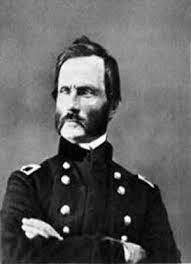American Primeval on Netflix takes viewers to the harsh-wild landscapes of Utah Territory in 1857, where survival is a brutal battle. The series is set during the Utah War—which was an armed conflict between the U.S. government, the Mormon militia, Native American tribes and settlers. It tells a story of betrayal, hope, and strength. There is the Mountain Meadows Massacre at its heart. This was a real tragedy in which a wagon train of emigrants was attacked and over 120 people were killed. With characters like Captain Edmund Dellinger coming to life, this unflinching drama from Mark L. Smith (The Revenant) and Peter Berg (Friday Night Lights) blurs the line between fact and fiction. But is this U.S. Army officer based on a real general? Let’s get into the specifics.
A Fictional Hero in a Brutal Reality;
Lucas Neff plays Captain Edmund Dellinger, who is a figure of order in a world full of chaos. He is in charge of stopping violence in the Utah Territory, but the moral and political issues of the time make it hard for him to do so. At first, Dellinger is optimistic but the horrible things he sees, especially the Mountain Meadows Massacre, break his faith in humanity. His character is both heroic and tragic; he is a man who has to deal with the cruelty of other people.
Dellinger seems real but he is a character made up by someone else. But his experiences are a lot like those of real people in history, like U.S. Army officer Brevet Major James Henry Carleton, who was sent to look into what happened after the Mountain Meadows Massacre.
The Similarities in Real Life: James Henry Carleton

He was a man of duty who was thrown into a horrible reality just like Dellinger. Two years after the massacre, in 1859, Carleton was sent to look into it and write down what he saw. His part was very important in finding out what really happened. Carleton’s research painted a bleak picture: an attack planned ahead of time by the Mormon militia, with help from Paiute warriors. Native Americans were wrongly blamed for the massacre to hide the real killers.
In contrast, Captain Dellinger’s arc in the series is more dramatic and symbolic. As a fictional character, Dellinger represents the broader struggle of moral integrity in the face of overwhelming violence. His detailed reports showed how violent the event was, which went against attempts to hide the truth.
Dellinger and Carleton’s Different Fate
In American Primeval, Dellinger’s story ends in tragedy, but Carleton’s story went in a different direction. When Carleton was done with his investigation, he left the Utah Territory and went back to work as a soldier. As he worked his way up, he became a lieutenant colonel in the 4th Cavalry Regiment. Carleton’s legacy is marked by his work to get justice for the massacre victims and to record the truth about the past.
The story of Captain Dellinger, on the other hand, is more dramatic and symbolic. Dellinger is a character in a story, but he represents the struggle of morality in the face of extreme violence. His death is a sad reminder of how many lives are lost in frontier conflicts.
Fact and Fiction in American Primeval
American Primeval does a great job of mixing real events with made-up stories. Although characters like Dellinger are made up by writers, the stories they are based on are based on real events. The show’s version of the Mountain Meadows Massacre shows how big and horrible the event was, and how it changed the lives of those who were there.
The show also features real people from history, like Brigham Young, the founder of the Mormon Church, and Jim Bridger, a famous frontiersman. These characters keep the story grounded in reality and give the fictional parts more depth. Having characters like Dellinger on the show lets it explore deep ideas about right and wrong, justice, and how to survive in a lawless world.
Why Fictionalize a Historical Character?
By making up characters like Captain Dellinger, storytellers can use the complexities of history without having to be too accurate. By looking to people like Carleton for ideas, the writers can create a story that hits close to home while also explaining historical events. The character of Dellinger is used to look into the moral problems and personal struggles of the time.
Moreover, fictionalizing a character provides flexibility in storytelling. It enables the writers to weave Dellinger’s journey into the broader narrative, connecting him to other fictional and historical characters. This approach enhances the drama and keeps viewers engaged while honoring the essence of the historical events.
Read More: American Primeval: Is Fort Bridger Based on a Real Place?